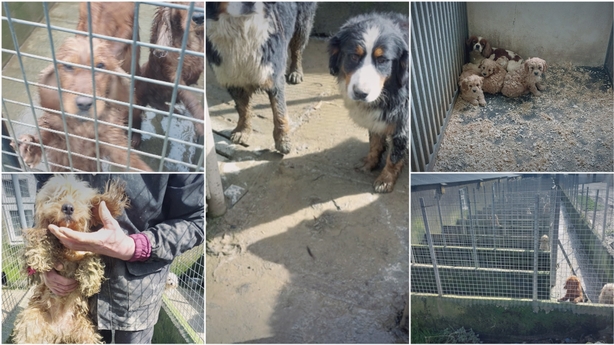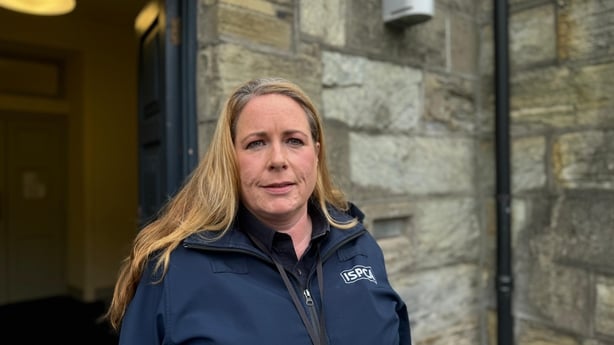A couple who operated a puppy farm from an old piggery on their property in west Cork have had the severity of their sentences reduced on appeal in the Circuit Court.
William Sheehy, 57, and Eleanor Sheehy, 50, of Grange More, Timoleague, Co Cork appeared before Judge Helen Boyle at Cork Circuit Court in Bandon.
Tim O'Connor acting for the Department for Agriculture, Food and the Marine said that the Sheehys had pleaded guilty in the District Court to six charges of animal neglect under the Animal Health and Welfare Act 2013 in relation to the poor conditions in which they kept the dogs on their premises.
Last month Judge Monica Leech sentenced William and Eleanor Sheehy to five months in custody suspended for two years.
They were each fined €1,000 for each of the six convictions with three months to pay and ordered to pay the €12,822.48 in costs incurred by the ISPCA in re-homing the first 14 dogs.
The court ordered them to surrender the remaining animals "forthwith" and ordered that immediate steps should be taken to ensure their safety and well-being.

They were also ordered to pay the costs of rehoming the remaining dogs at their premises with those costs "to be quantified."
The court also disqualified William and Eleanor Sheehy from owning or breeding dogs for life.
Giving evidence, ISPCA inspector Caroline Faherty said that she went to the Sheehy’s farm on 21 March 2023 to inspect the kennels on foot of a complaint from a member of the public.
She said that her first impression was that the kennels were "filthy and stinking" and that there was an "overpowering smell of ammonia."
She told the court that there were 50 adult dogs and 22 puppies present of various breeds including cocker spaniels, poodles, bichons, cavaliers, Bernese mountain dogs, Newfoundlands, collies, Jack Russells and cross breeds.
Ms Faherty said that "there was faeces everywhere" when she entered the kennels, some of which was mouldy indicating it had been there for some time.
She said that all the pens where wet and that plastic fish boxes were used for bedding, all of which had been chewed and had sharp edges.
She described the water bowls as filthy and said that the kennels were cold and that the puppy wing felt "colder than the temperature outside."
Ms Faherty said that many of the dogs had matted fur, runny eyes, itchy ears and some showed signs of conjunctivas and alopecia.

Some of the animals had discharges coming from their ears and also showed behavioural issues such as spinning on the spot indicating they had not been properly socialised.
Ms Faherty said that she issued the Sheehys with a notice and informed them she would return in two days for a further inspection.
On 23 March 2023 she returned accompanied by the chief veterinary inspector, the county dog warden and the local dog warden.
On that occasion it was decided to remove the 14 dogs that were in the worst condition as that was all that could be accommodated at the time. The Sheehys agreed and surrendered the animals.
Ms Faherty said that the 14 dogs were subsequently re-homed following veterinary treatment.
She told the court that a female Newfoundland dog that was surrendered could not be re-homed for some time because she "had a coat like cement" and was so emaciated she was "skeletal."
A further inspection was carried out in August 2023 and Ms Faherty said the kennels were cleaner but still "inadequate."
She told the court that the building where the kennels were located was a former piggery and was "not fit for purpose and water was running down into it from the dairy farm that was on higher ground nearby.
Ms Faherty told the court that she visited the kennels again on 22 October 2024 where she found that dogs were still standing in water.
She said that the Sheehys were no longer feeding the dogs by scattering food which resulted in a "survival of the fittest" situation but food was being left in bowls for a long period of time.
Defence solicitor Conrad Murphy said that the Sheehys had been breeding dogs from 2016 to 2023 "without any problems," he said that that in late 2022 Ms Sheehy’s mother had died and two of their four children had emigrated to Australia and they had gone through a "difficult period" and let "standards slip."
He said that the media attention surrounding the case had been very difficult for them and they had been subject to abuse on social media, by phone and text, in writing and in person as a result.
Mr Murphy said that there was no question of them seeking a breeding license again but they would like to be able to keep their two working collie dogs on the farm.
"Despite what people think, they are dog lovers," he said.
He added that the suspended sentences imposed in the District Court could present a problem for Ms Sheehy's employment as a nurse and he added that the financial penalties imposed were "almost catastrophic" for them.
Judge Boyle said: "This was obviously run for profit. A puppy farm treating dogs as farm animals and it was probably even more profitable during Covid."
She said that she would take into account the fact that the Sheehys pleaded guilty and had no previous convictions.
The judge also said that she accepted there was an element of "social shaming" which had impacted on them.
The judge upheld the disqualification from breeding dogs for life but she permitted the Sheehys to keep the two collies and one "house dog".
She also removed the suspended prison sentences.
She directed that the Sheehys would pay the €12,822 cost of treating and rehoming the first 14 dogs removed from their premises and allowed eight months to pay.
The judge also ordered that they pay the €14,222 cost to date of treating and rehoming the remaining dogs, allowing 12 months to pay after the initial eight months.
She ordered that they pay an additional €3,000 after that to cover the costs of rehoming the remaining animals.
She reduced the level of fines from €1,000 on each of the 12 counts down to €250 for a total fine of €3,000.

